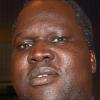“A society that does not recognize that each individual has values of his own which he is entitled to follow can have no respect for the dignity of the individual and can not really know freedom.” (Friedrich Hayek)
Sudan achieved independence from British colonialism in January 1956. A protracted civil war followed, raging between successive Islamic fundamentalist ruling cliques in the north and the Christian-dominated south. Eventually, this led to the south becoming an independent state in 2011.
In 1983, conflict broke out due to the repressive political and religious policies of the Islamic fundamentalist regime. The Christian south reacted against institutionalized Islamization, slavery, employment inequality, injustices in wealth sharing and the infringement of basic rights and freedoms.
The conflict raged until 2005. During this time, many Sudanese people like me did not know life apart from this state of violent conflict. More than two million people died during this time. Generations lost opportunities at education and dignified living. Hunger and starvation, disease, human-rights violations and crimes against humanity, child soldiering, the abuse of women and children, torture and disappearances were commonly experienced by many South Sudanese Christians with dark African skin.
In May 2000, I made my first attempt to flee the country. I was stopped by security at the airport, even though I had valid travel documents. I was taken in for investigation, and accused of inciting the public against the government and of supporting the rebel’s opposition calling for democracy and rule of law.
Two months later, I was picked up by security and accused of conducting secret meetings with government representatives who secretly opposed the government and who were collaborating with rebels. I spent four months in political detention without any court procedures before being released with strict terms and conditions. I was not allowed at public gatherings and could not visit the offices of government or non-governmental organizations. I could not travel anywhere outside of Khartoum. Failure to comply would be met with serious consequences.
My friend who worked for the government warned me not to ignore their threats. He had seen many people being tortured at night in the detention centres known as “ghost houses.”
In April 2001, I decided to flee for good. Two months later, I left Khartoum, leaving behind my wife, three young children and the country of my birthright. With a forged passport, I took the two-day train journey to Halfa, where I boarded a river barge across the Nile to the Port of Aswan.
Throughout this escape, I was lost in a nightmare of deepening feelings and disbelief. I played over in my mind the fate of my family, colleagues, close relatives, friends, and, above all, my loss of dignity and statehood. My questions did not lead to any convincing answers, except to praise and thank God for protecting me from security agents.
In Egypt, I surrendered myself to the United Nations High Commission for Refugees and was granted asylum.
In July, I received a call that my family had arrived. That reunion was a happy turning point for me. In August, we were ready to travel to Canada. Unfortunately, the tragic 9/11 bombing delayed us, but we travelled to Fredericton, N.B., in December 2002.
My asylum journey for freedom and justice continues to shape my life to this day. My memories are both painful and happy. The violent conflict forced me into years of life in exile, depriving me of meaningful parenthood, community life and a nation to be proud of. My children have also been affected by this tragedy.
Joseph M. Wuol and his family came to worship at Kitchener (Ont.) First Mennonite Church in June 2006. He is the chair of the South Sudanese Peacebuilding Organization in Kitchener.





Add new comment
Canadian Mennonite invites comments and encourages constructive discussion about our content. Actual full names (first and last) are required. Comments are moderated and may be edited. They will not appear online until approved and will be posted during business hours. Some comments may be reproduced in print.